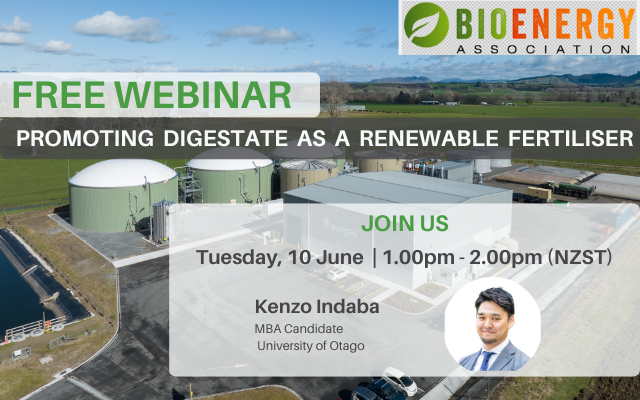Webinar: Promoting Digestate as a Renewable Fertiliser in New Zealand
New Zealand can reduce agricultural GHG emissions and enhance soil health by adopting digestate as a sustainable, circular fertiliser alternative to synthetic options.
New Zealand’s agricultural sector faces growing pressure to reduce greenhouse gas (GHG) emissions while maintaining productivity and resilience.
Digestate, a nutrient-rich by-product of anaerobic digestion (AD), offers a sustainable alternative to synthetic fertilisers, reducing emissions, enhancing soil health, and reducing reliance on carbonintensive imported products.
Biogas adoption in NZ can be accelerated by the effective monetisation of digestate, as its revenue significantly enhances the financial viability of biogas plants.
This webinar will present findings from a comprehensive study on digestate adoption, exploring its economic viability, environmental benefits, and strategies to overcome market barriers.
Key findings from the analysis:
- Digestate can reduce GHG emissions by replacing synthetic fertilisers, which contribute 5% to New Zealand’s total emissions, while improving soil health and nutrient cycling.
- Economic analysis indicates that digestate is unlikely to generate substantial revenue under current carbon prices under current carbon and fertiliser prices but will become a viable revenue stream by 2030 under the projected carbon price. New Zealand’s fertiliser market, dominated by two major cooperatives, poses structural barriers, but partnerships with industry, corporate processors, and regional councils can drive digestate adoption.
The Bioenergy Association invites anyone interested in how bioenergy and biofuels could contribute to a sustainable low carbon future to attend this webinar.
About the presenter
 Kenzo is an MBA candidate at the University of Otago in New Zealand, where he authored this report as part of a Professional Consulting Engagement with the Bioenergy Association (BANZ).
Kenzo is an MBA candidate at the University of Otago in New Zealand, where he authored this report as part of a Professional Consulting Engagement with the Bioenergy Association (BANZ).
Prior to his MBA, Kenzo worked in the power industry in Japan, for 15 years, where he contributed to projects such as offshore wind development. With a focus on sustainable agriculture, Kenzo’s research provides actionable insights into integrating digestate into New Zealand’s farming systems.




